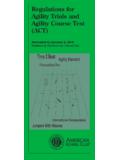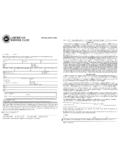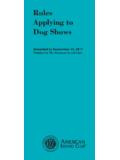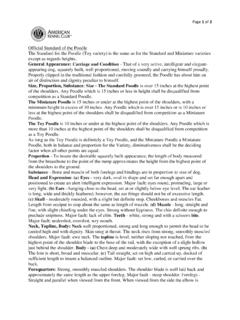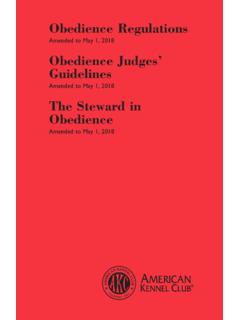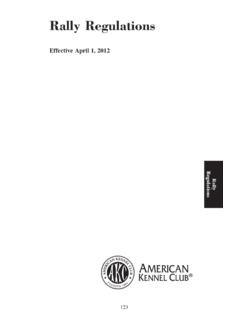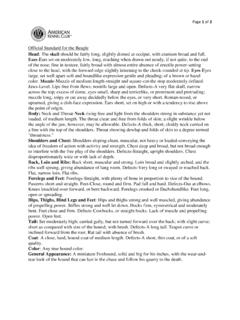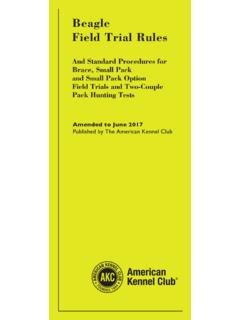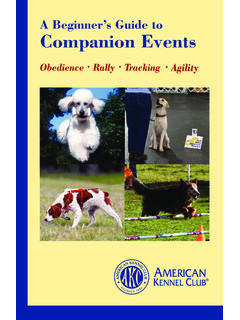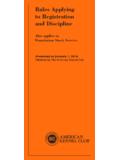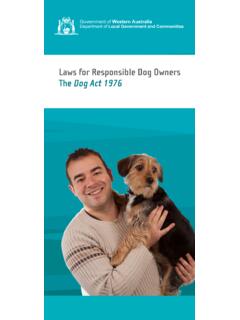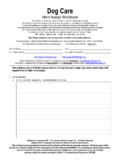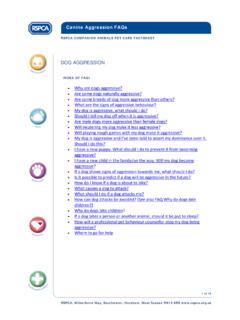Transcription of Page 1 of 4 - American Kennel Club
1 Page 1 of 4 Official Standard for the Labrador Retriever General Appearance: The Labrador Retriever is a strongly built, medium-sized, short-coupled, dog possessing a sound, athletic, well-balanced conformation that enables it to function as a retrieving gun dog; the substance and soundness to hunt waterfowl or upland game for long hours under difficult conditions; the character and quality to win in the show ring; and the temperament to be a family companion. Physical features and mental characteristics should denote a dog bred to perform as an efficient Retriever of game with a stable temperament suitable for a variety of pursuits beyond the hunting environment. The most distinguishing characteristics of the Labrador Retriever are its short, dense, weather resistant coat; an "otter" tail; a clean-cut head with broad back skull and moderate stop; powerful jaws; and its "kind," friendly eyes, expressing character, intelligence and good temperament.
2 Above all, a Labrador Retriever must be well balanced, enabling it to move in the show ring or work in the field with little or no effort. The typical Labrador possesses style and quality without over refinement, and substance without lumber or cloddiness. The Labrador is bred primarily as a working gun dog; structure and soundness are of great importance. Size, Proportion and Substance: Size-The height at the withers for a dog is 22 to 24 inches; for a bitch is 21 to 23 inches. Any variance greater than inch above or below these heights is a disqualification. Approximate weight of dogs and bitches in working condition: dogs 65 to 80 pounds; bitches 55 to 70 pounds. The minimum height ranges set forth in the paragraph above shall not apply to dogs or bitches under twelve months of age.
3 Proportion-Short-coupled; length from the point of the shoulder to the point of the rump is equal to or slightly longer than the distance from the withers to the ground. Distance from the elbow to the ground should be equal to one half of the height at the withers. The brisket should extend to the elbows, but not perceptibly deeper. The body must be of sufficient length to permit a straight, free and efficient stride; but the dog should never appear low and long or tall and leggy in outline. Substance-Substance and bone proportionate to the overall dog. Light, "weedy" individuals are definitely incorrect; equally objectionable are cloddy lumbering specimens. Labrador Retrievers shall be shown in working condition well-muscled and without excess fat.
4 Head: Skull-The skull should be wide; well developed but without exaggeration. The skull and foreface should be on parallel planes and of approximately equal length. There should be a moderate stop-the brow slightly pronounced so that the skull is not absolutely in a straight line with the nose. The brow ridges aid in defining the stop. The head should be clean-cut and free from fleshy cheeks; the bony structure of the skull chiseled beneath the eye with no prominence in the cheek. The skull may show some median line; the occipital bone is not conspicuous in mature dogs. Lips should not be squared off or pendulous, but fall away in a curve toward the throat. A wedge-shape head, or a head long and narrow in muzzle and back skull is incorrect as are massive, cheeky heads.
5 The jaws are powerful and free from snippiness- the muzzle neither long and narrow nor short and stubby. Nose-The nose should be wide and the nostrils well-developed. The nose should be black on black or yellow dogs, and brown on chocolates. Nose color fading to a lighter shade is not a fault. A thoroughly pink nose or one lacking in any pigment is a disqualification. Teeth-The teeth should be strong and regular with a scissors bite; the lower teeth just behind, but touching the inner side of the upper incisors. A level bite is acceptable, but not desirable. Undershot, overshot, or misaligned teeth are serious faults. Full dentition is preferred. Missing molars or pre-molars are serious faults. Ears-The ears should Page 2 of 4 hang moderately close to the head, set rather far back, and somewhat low on the skull; slightly above eye level.
6 Ears should not be large and heavy, but in proportion with the skull and reach to the inside of the eye when pulled forward. Eyes-Kind, friendly eyes imparting good temperament, intelligence and alertness are a hallmark of the breed. They should be of medium size, set well apart, and neither protruding nor deep set. Eye color should be brown in black and yellow Labradors, and brown or hazel in chocolates. Black, or yellow eyes give a harsh expression and are undesirable. Small eyes, set close together or round prominent eyes are not typical of the breed. Eye rims are black in black and yellow Labradors; and brown in chocolates. Eye rims without pigmentation is a disqualification. Neck, Topline and Body: Neck-The neck should be of proper length to allow the dog to retrieve game easily.
7 It should be muscular and free from throatiness. The neck should rise strongly from the shoulders with a moderate arch. A short, thick neck or a "ewe" neck is incorrect. Topline-The back is strong and the topline is level from the withers to the croup when standing or moving. However, the loin should show evidence of flexibility for athletic endeavor. Body-The Labrador should be short-coupled, with good spring of ribs tapering to a moderately wide chest. The Labrador should not be narrow chested; giving the appearance of hollowness between the front legs, nor should it have a wide spreading, bulldog-like front. Correct chest conformation will result in tapering between the front legs that allows unrestricted forelimb movement.
8 Chest breadth that is either too wide or too narrow for efficient movement and stamina is incorrect. Slab-sided individuals are not typical of the breed; equally objectionable are rotund or barrel chested specimens. The underline is almost straight, with little or no tuck-up in mature animals. Loins should be short, wide and strong; extending to well developed, powerful hindquarters. When viewed from the side, the Labrador Retriever shows a well-developed, but not exaggerated forechest. Tail-The tail is a distinguishing feature of the breed. It should be very thick at the base, gradually tapering toward the tip, of medium length, and extending no longer than to the hock. The tail should be free from feathering and clothed thickly all around with the Labrador's short, dense coat, thus having that peculiar rounded appearance that has been described as the "otter" tail.
9 The tail should follow the topline in repose or when in motion. It may be carried gaily, but should not curl over the back. Extremely short tails or long thin tails are serious faults. The tail completes the balance of the Labrador by giving it a flowing line from the top of the head to the tip of the tail. Docking or otherwise altering the length or natural carriage of the tail is a disqualification. Forequarters: Forequarters should be muscular, well coordinated and balanced with the hindquarters. Shoulders-The shoulders are well laid-back, long and sloping, forming an angle with the upper arm of approximately 90 degrees that permits the dog to move his forelegs in an easy manner with strong forward reach. Ideally, the length of the shoulder blade should equal the length of the upper arm.
10 Straight shoulder blades, short upper arms or heavily muscled or loaded shoulders, all restricting free movement, are incorrect. Front Legs-When viewed from the front, the legs should be straight with good strong bone. Too much bone is as undesirable as too little bone, and short legged, heavy boned individuals are not typical of the breed. Viewed from the side, the elbows should be directly under the withers, and the front legs should be perpendicular to the ground and well under the body. The elbows should be close to the ribs without looseness. Tied-in elbows or being "out at the elbows" interfere with free movement and are serious faults. Pasterns should be strong and short and should slope slightly from the perpendicular line of the Page 3 of 4 leg.
